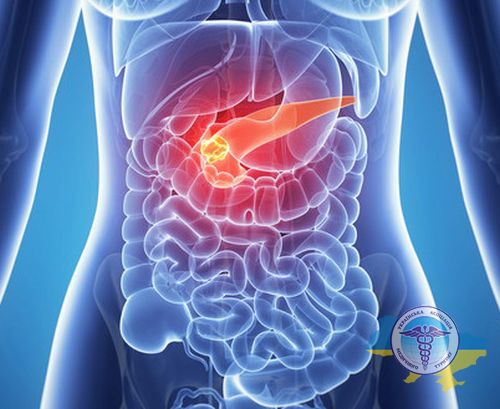Treatment of pancreatic cancer in clinics of Germany

Pancreatic cancer is a serious problem in oncology. The most common histological variant is pancreatic adenocarcinoma, which is detected in approximately 85% of cases. This tumor is characterized by an aggressive course and poor prognosis.
Unfortunately, in the early stages, this disease is practically asymptomatic. Most often, the diagnosis is established in the presence of metastases, which significantly complicates treatment. The main complaints of patients are pain in the upper abdomen, weight loss, jaundice.
In Germany, the latest protocols and equipment are used to treat pancreatic cancer, making it possible to combat this serious illness as effectively as possible and prolong the lives of patients. Therefore, timely contacting one of the German clinics at the first symptoms is the key to a successful outcome of further therapy.

Do you want to know how much the treatment costs?
Answer a few questions and get a preview of the cost of diagnosis and treatment!
Advantages of pancreatic cancer treatment in Germany
- Advanced diagnostics. In Germany, the latest advances in the field of oncology diagnostics are used, which allows the disease to be detected as early as possible. Here, MRI is performed on tomographs with a magnetic field strength of 3 Tesla - this guarantees the receipt of images of the highest quality. The method of simultaneous positron emission and computed tomography is also used, which allows one to see metastases and areas of increased metabolic activity.
- High-tech equipment. This includes the latest generation magnetic resonance imaging scanners, digital X-ray machines, gamma cameras, linear accelerators, etc. High-tech surgical methods are also used - robotic and endoscopic operations.
- Innovative techniques. German clinics are actively introducing and constantly improving the latest minimally invasive methods. They allow the most effective impact on cancer cells, reducing damage to healthy tissue.
- Experienced specialists. Some of the most qualified oncologists and oncosurgeons in the world work here. This ensures that patients receive the highest level of care.
- Integrated approach. Therapy is multidisciplinary in nature. When treating pancreatic oncology in Germany, a whole council of doctors of different specialties - oncologists, surgeons, radiologists, chemo therapists, etc. - is involved in developing the optimal tactics for each specific patient.
- Government funding. The country's healthcare system receives significant financial support from the state budget. This makes it possible to constantly equip clinics with the latest technology, conduct scientific research, and train specialists.
- Strict quality control. In Germany, clear standards of medical care have been adopted at the state level that are mandatory. This ensures that patients receive the highest quality medical services.
Diagnostics of pancreatic oncology in Germany

Diagnosis of the disease presents certain difficulties, since in the early stages it occurs without pronounced symptoms. To identify a tumor and determine the stage during the diagnosis of pancreatic cancer, German clinics use a complex of modern methods:
- Ultrasound examination. The most accessible method that allows you to identify space-occupying formations in the pancreas and surrounding tissues. For a more detailed study, endosonography is used.
- MRI. Provides detailed images of internal organs and the ability to assess the condition of the pancreas and the extent of tumor spread.
- Computed tomography. The study is carried out using modern multi-slice CT machines, which allow obtaining thin sections with high resolution. Thanks to CT, it is possible to accurately determine the location, size of the tumor, its relationship with the great vessels and surrounding organs, as well as the presence of distant metastases.
- Oral cholangiopancreatoscopy. A method for visualizing the ductal system of the pancreas and biliary tract using a flexible endoscope.
- Laparoscopy. A minimally invasive surgical procedure in which a laparoscope is inserted through small punctures in the abdominal wall to examine the abdominal organs and identify metastases.
- Endoscopic retrograde cholangiopancreatography. Method of contrasting the pancreatic ducts and biliary tract, performed through endoscopic access.
- Ultrasound-guided biopsy. A puncture method for obtaining a sample of tumor tissue for subsequent histology.
- Percutaneous transhepatic cholangiography. X-ray examination of the biliary tract by puncture injection of contrast through the skin.
Methods of treatment of pancreatic cancer in German clinics

For the treatment of pancreatic cancer in German clinics, the entire arsenal of modern methods is used to combat this disease - both surgical and conservative. An individual therapy program is developed by a council of experienced oncologists, taking into account the specific clinical situation.
Surgical intervention
The key method for radical treatment of pancreatic cancer, provided that the tumor has not grown into the great vessels and can be completely removed. Depending on the location and extent of the tumor, the following types of operations are performed:
- Pancreatoduodenal resection. It is performed when the head of the pancreas is affected. Provides for the removal of the head itself, the duodenum, the gallbladder, part of the stomach and regional lymph nodes.
- Distal resection. It is used for the localization of cancer cells in the tail of the pancreas. Includes removal of tail and spleen.
- Total pancreatectomy. Complete removal of an organ, which is performed when the lesion is widespread.
German oncology surgeons use modern minimally invasive technologies - laparoscopic and robotic access, which reduces the invasiveness of the operation and speeds up the rehabilitation of patients. Thanks to the highly qualified specialists, complications after such complex operations are extremely rare.
Conservative methods of therapy
In addition to surgery, modern conservative techniques play an important role in the complex treatment of pancreatic cancer. They are aimed at destroying cancer cells, preventing the growth and spread of the tumor, which allows achieving good results even in the later stages of the disease.
Chemotherapy
It is used to destroy cancer cells using cytostatic drugs. A combination of several different medications is often prescribed to increase effectiveness.
The courses are repeated with breaks to allow the body to recover. Chemotherapy is used before or after surgery, as well as for inoperable tumors. German oncologists carefully select a regimen based on the patient's condition in order to minimize side effects.
Radiation therapy
Used in combination with chemotherapy for the treatment of locally advanced pancreatic cancer. It allows you to reduce the size of the tumor before surgery or relieve symptoms in inoperable cases.
In Germany, high-precision radiotherapy is used on modern accelerators, which makes it possible to target the tumor as accurately as possible, minimizing damage to healthy tissue. German radiologists carefully plan the course for each patient, taking into account the characteristics of the tumor.
Targeted therapy
This is the use of targeted drugs that act on molecular targets in cancer cells. They block signaling pathways necessary for tumor growth and division. The use of targeted therapy increases the effectiveness of treatment and increases the life expectancy of patients.
German doctors use the tyrosine kinase inhibitor erlotinib in combination with chemotherapy. It inhibits the activity of epidermal growth factor receptors on the surface of tumor cells.
Innovative techniques
In German clinics, along with traditional approaches, advanced techniques are used, which, at the same time, are highly effective and safe.
Stereotactic therapy
High-precision method of tumor irradiation under the control of computer navigation. Allows you to deliver a high dose of radiation directly to the lesion, minimizing the radiation dose to surrounding tissue.
German centers use advanced equipment for stereotactic therapy - Gamma Knife and Cyber Knife. The method is used in cases where surgical intervention is impossible or when the tumor is residual.
Immunotherapy
One of the key areas is immunotherapy using PD-1/PD-L1 inhibitors. These drugs block the interaction between cancer cells and T lymphocytes, which allows the immune system to recognize and destroy the tumor.
Clinical studies demonstrate a pronounced positive effect of immunotherapy in combination with chemotherapy, including in metastatic pancreatic cancer. An important advantage is good tolerability and low risk of complications.
Embolization of metastases
Selective transarterial chemo embolization is a highly effective minimally invasive method for the treatment of metastatic pancreatic oncology. The essence of the method is the targeted delivery of chemotherapy drugs and emboli directly into the tumor vessels. This leads to blockage of blood flow and necrosis of tumor tissue.
The advantages are the local effect of chemotherapy without systemic toxicity, the possibility of use in inoperable cases, good tolerability, and the absence of long-term rehabilitation.
Nanoknife (nanopulse therapy)
A promising direction, which is the non-thermal effect of short-term high-voltage electrical pulses directly on tumor cells. This leads to the formation of pores in cell membranes and the initiation of apoptosis processes.
The advantage of the method is high selectivity for cancer cells while maintaining the integrity of surrounding tissues, which is especially important for the pancreas.
Proton therapy
Tumor irradiation with a controlled proton beam. Thanks to precise focusing of the beam, maximum oncolytic effect is achieved against cancer cells with minimal damage to healthy tissue.
The method is based on damage to the DNA of tumor cells. Its main advantages are high efficiency, accuracy and safety compared to traditional impact techniques.
Cost of pancreatic cancer treatment in Germany
Prices for pancreatic cancer treatment in Germany vary depending on the stage of the disease, the amount of necessary examinations and medical procedures, qualification of doctors and equipment of the clinic and many other factors.
You can find approximate rates for basic medical services in the table below:
| Procedure | Cost, € |
|---|---|
| Oncologist consultation | from 300 |
| Abdominal MRI | from 800 |
| PET-CT | from 1500 |
| Endoscopic biopsy | from 2500 |
| Histological examination | from 1000 |
| Oncomarker detection | from 500 |
| Pancreatic resection surgery | from 25000 |
| Adjuvant chemotherapy | from 4000 |
| Radiation therapy | from 5000 |
| Targeted therapy | from 3000 |
To calculate the exact cost, an examination and specific recommendations from an oncologist are required. Send your medical data to our consultant and UAMT will request a full cost estimate from the selected medical center.



